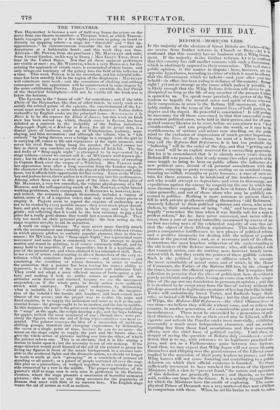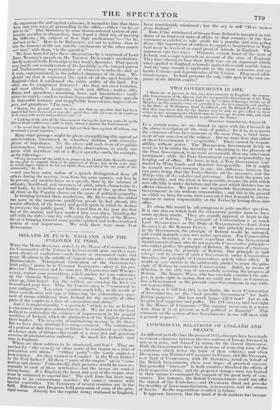TOPICS OF THE DAY.
REFORAI—MORE;OR LESS.
Ir the majority of the electors of Great Britain are Tories—ifth,v are averse from further returns in Church or State—let it b'e confessed that this country has no business with a Whig Govern. mcnt. If the majority desire further reffirms, let it be confessed that this country has still smaller concern with such El GOVerlimeni which is obstinately opposed to their concession. The real state of public opinion, is the matter in dispute : here, however, are two opposite hypotheses, according to either of which it must be allowed, that the Government which we behold—and year after year hate. beheld—in office, has been ruling in defiance of the country. Strange sight ! yet not so strange as the cause which makes it possible. It is likely enough that the Whig Relbrin delusion will never lie quite dissipated so long as the life of any member of the present Cabinet is spared to us. To speak more precisely, the power of the Whi2 leaders to beguile the natural sense and spirit of those who weri, their companions in arms in the Reform Bill movement, will pro. - bably endure for the term of the natural lives of both parties, the dupers and the duped. So powerful is association ! It will perhaps be necessary for all those concerned in that first successfid assault on ancient political error, to be laid in their graves, and for all pane- gyrical oratory likewise to be over, before we can return to a " level consideration," and can properly rate the worth, or it may be the worthlessness, of actions and actors now dwelling on the public mind to the exclusion of impressions of much greater importance. During the lives of those whom, fOr want of a better name, ve may call the Reform-Bit/ /?yinaners, it is but too probable that "hallooing" will be the order of the day, and that " getting out of the wood" will be an exploit reserved for a succeeding generation. But let it be remembered that it is already seven years since the Reform Bill was passed ; that it only wants two other periods of the same length to bring to bear on public affairs the influence of a new political race, devoid of n11 personal associations with that measure, enjoying no party revenges, resting on no nominal victory, boasting no selfish triumphs or petty honours ; a race of men cer- tain, for these reasons, to be intolerant of the laudatures Imports (tell who would attempt to depreciate, and even to discourage, new expeditions against the enemy by magnifying the one in which they were themselves engaged. We speak lucre of future Liberal pan- clans generally, and not of those alone who may be publicly con- cerned in politics. Nothing is more common at present than to full in with private gentlemen calling themselves "old Reformers," sincerely Liberal in their political opinions and views, who never- theless, by their misfortune of being " old," and because they un- happily " remember the time when it was hardly safe for a man to profess reform," &c. &c. have never recovered, and never will re- cover, from a sort of mental imbecility occasioned by excess of' joy on first receiving news of the celebrated minority of oxn that car- ried the object of their lifelong aspirations. This imbecility int- parts a comparative indifference to new phases of political rethrm, and a positive incapacity for dealing with the subject of popular claims at the present time ; and, as a necessary part of its effects, it occasions the most hopeless subjection of the understanding to time old leaders of the Reform movement ; who, still identified with that vaunted action, can do nothing now, however basely incon- sistent with it, but they retain the praises of these gullible veterans. Snell is the political insipience or silliness which is amongst the most remarkable of actual signs, and of which, in the House of Commons, time Father of the Refloat' Bill has, by the change of the times, become the efficient representative. But it requires little reflection to perceive that the class of politicians here described is purely accidental and peculiar, having no connexion with the sympa- thies of the age nor any foundation in permanent opinion ; and that it is destined to be swept away from the thee of society without the privilege accorded to legitimate creatures of leaving their like behind. Tories will undoubtedly breed Tories, and Radicals beget Radi- cals; so indeed will Whigs beget Whigs ; but for that peculiar class, of' Whigs, the Reform-./Jill Rijiwincrs—the chief Obsttmth es al our time—we believe they will die without issue, and so relieve the country, in another generation, of a considerable part of its present incumbrances. These must be succeeded by a generation of poli- tical thinkers, who, in as thr as their creed may be Liberal, will in- vigorate and refresh the Popular ranks most materially', exhibiting necessarily a much more independent character, and an under- standing free from those fond associations and their enervating effects, now the chief bane of political society. Until then, we despair of seeing the question of Reform duly considered—consi- dered, that is to say, with reference to its legitimate practical ob- jects, and not as a Parliamentary game between two ffictions. Until then, we may expect that Whig chilies will not cease blessing themselves and chirping over the grand success of the Liberal cause implied in the accession of their party leaders to power; and that Whig knaves will not cease fostering and contributing to a public delusion on which their official existence is founded. To those sufficiently irreverent to have watched the actions of the Queen's Ministers with a view to " prevent fraud," the nature and operation of this delusion are practically known ; and therein, as we have said, resides our hope Ibr the future. It is a subtilty beyond Ham- let which the Ministers have the credit of exploring. The meta- physical Prince of Denmark was a very matter-of-fact sort of fellow in comparison with them. When lie set his brains to work to solve the arguments for and against existence, it seemed to him that there were only two ways of proceeding in the affair,—either " to be, or not to be." Our Ministers, by some transcendental system of phi- losophy peculiar to themselves, have found a third way of meeting the difficulty; the wited, of their high meditations is—" to be, and not to be." , How to be Reformers, yet not to reform—how to win the honours of the one and the emoluments of the other course --" that," with them, "is the question." We have been led into these observations by a reperusal of Lord JOHN RussELL's speech on Mr. TuomAs 1)u:woman's resolutions, briefly noticed in the Postscript to last week's Spectator. That speech may justify our consideration of his Lordship as the natural patron and Parliamentary representative of whatever is imbecile, and, as it were, superannuated, in the political character of the time. We should say that it expressed the spirit of all the aged females in England—that it condensed the entire nullity of the land. For what are its component tbatures ? Are they not most feminine, and most elderly ? Language, weak and diffuse ; matter, silly, flimsy, and querulous ; reasoning, loose and inconclusive; senti- ments to match,—such us random deprecations of injustice, appeals to impossible leniency and inapplicable benevolence, hopes extem- pore, and gratuitous " I'm sures." "During the present session he teas sure that no question that had been mooted had been discussed in any Other spirit than with reference to its tendency to do away with social and political evils" I
"Looking at the acts of the Government during the lust ten years, he really did not think indifference could be fairl) charged against the Government."
" To assert that the Government had set their faces against all reform, was to commit a great injustice."
Many other passages might be given exemplifying this appeal ad miserieordiam, intermixed, in schoolboy fitshion, with excessive pieces of impudence. To the above add such store of exquisite commonplace, truisms, and indefinite observations, as rarely one meets with anywhere out of a Royal speech,—such, for example, as the following- " If any measures of the kind were proposed, he (Lord John Russell) would be very glad to support them if he approved of them ; but at the same time he would oppose them if he did not think them calculated for the good of the community," 8:e. Re.
—and you have some notion of a speech distinguished from all others during the session, even from the same quarter, not less by its poverty and wretchedness as a speech, than by the mixture of obliquity, hardihood, and meanness of spirit, which characterize it ; and lastly, by its further and further removal of the speaker front all chtim on the Popular classes on the score of political sympathy.
In bringing tbrward these resolutions, Mr. 1)1.:scom on has added one more to the numerous gratifying proofs he had already this session afforded, of the hearty and genial spirit in which he desires to prosecute the public good. We Ibund hint at his post the first day of the session, and have marked hint ever since, blending the utile with the dulce—one day enlivening the stupidity of the House, the next bringing fbrward smite public-spirited and well-considered motion of real importance. We wish there were more TOM DENCONIIIES.



























 Previous page
Previous page